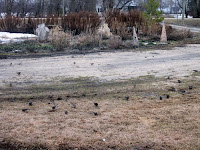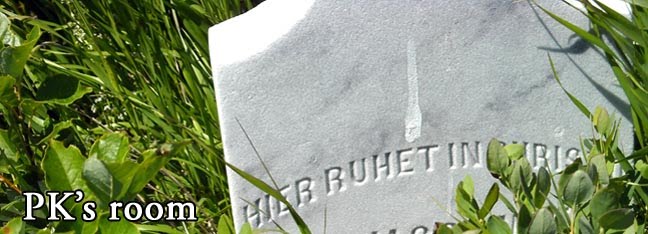 Well okay, just this one.
Well okay, just this one. 22 April 2011
Climb every mountain
 Well okay, just this one.
Well okay, just this one. 20 April 2011
The Moonlight Sonata of Beethoven Blatz (Act 2)
19 April 2011
The Moonlight Sonata of Beethoven Blatz (Act 1)
 On Saturday, together with friends, I travelled to the Rachel Browne Theatre in the Crocus Building to watch the Theatre Projects Manitoba production of Armin Wiebe's first play, The Moonlight Sonata of Beethoven Blatz. It's a four hand cast, two men and two women. The set appears to involve simple staging, until Obrum and Susch Kehler roll on a full-size upright piano into the temporary farm "shpika" (cabin/shed) they call home. It's the 1930s. The Kehlers are two-years married, in love, and poor. They work hard, and they still play, in every way. Obrum loves music and dreams that his Susch will learn to play more than chopsticks on the clavier. To that end he invites Beethoven Blatz, recently immigrated from Russia, to live with them, to tune the piano, and to teach Susch to play. Blatz comes haunted. He dreams of and speaks aloud of his love, Sonja, who plays the cello and, we presume, has stayed back in Russia. He mistakenly refers to Susch as Sonja, and these continual errors serve to raise the potential for something further.
On Saturday, together with friends, I travelled to the Rachel Browne Theatre in the Crocus Building to watch the Theatre Projects Manitoba production of Armin Wiebe's first play, The Moonlight Sonata of Beethoven Blatz. It's a four hand cast, two men and two women. The set appears to involve simple staging, until Obrum and Susch Kehler roll on a full-size upright piano into the temporary farm "shpika" (cabin/shed) they call home. It's the 1930s. The Kehlers are two-years married, in love, and poor. They work hard, and they still play, in every way. Obrum loves music and dreams that his Susch will learn to play more than chopsticks on the clavier. To that end he invites Beethoven Blatz, recently immigrated from Russia, to live with them, to tune the piano, and to teach Susch to play. Blatz comes haunted. He dreams of and speaks aloud of his love, Sonja, who plays the cello and, we presume, has stayed back in Russia. He mistakenly refers to Susch as Sonja, and these continual errors serve to raise the potential for something further.18 April 2011
Statutes of limitations?
17 April 2011
Sundays are for biking
 Together with JS, I drove out to Bruxelles (which is West and bit North of St. Leon) for the first road race of the season. The roads were gravel. And there was mud involved. The course was a 10 k loop (rectangle) with hills on each leg of the rectangle. I rode my cross bike, with the straight bar, and it performed admirably. Shifts were smooth and the brakes responsive. It was dirty tiring fun.
Together with JS, I drove out to Bruxelles (which is West and bit North of St. Leon) for the first road race of the season. The roads were gravel. And there was mud involved. The course was a 10 k loop (rectangle) with hills on each leg of the rectangle. I rode my cross bike, with the straight bar, and it performed admirably. Shifts were smooth and the brakes responsive. It was dirty tiring fun. 16 April 2011
Life and death



15 April 2011
Double bind: too short to blog, too long to tweet
14 April 2011
Running on empty
13 April 2011
Into the wind? Still a good day
12 April 2011
He reconsiders, with gravity
11 April 2011
He thinks back
10 April 2011
Black Dogs

09 April 2011
I hope
 If a girl can stand as strong as Ree (Jennifer Lawrence) in Winter's Bone, then there's a lot to be optimistic about. This movie not only passes the Bechdel test but establishes that a woman can not only be more resourceful than a man, she can be a whole lot more observant.
If a girl can stand as strong as Ree (Jennifer Lawrence) in Winter's Bone, then there's a lot to be optimistic about. This movie not only passes the Bechdel test but establishes that a woman can not only be more resourceful than a man, she can be a whole lot more observant. 08 April 2011
Fresh Rhubarb!
Cadence
06 April 2011
Water
05 April 2011
I have a cold
04 April 2011
301
03 April 2011
As they say
02 April 2011
Georgie wants to go for a bike ride
Sharon says she can’t leave the Barbies hanging from the front stoop rail, or from the trees in the back yard. Georgie doesn’t understand the concern about the neighbours, or about how to present ourselves to the public. She doesn’t concern herself past what’s in front of her now and though I’m with Sharon on the public image thing, I know Georgie. So now she rides with Barbie lynched and dangling from the handlebars. When she walks around the house, or outside, Barbie drags and bumps along behind her, abused and dust-covered like that American soldier in Somalia.
It’s nearing the end of the Summer heat as we pedal along. I suggest a destination – a playground, or the garden market – but Georgie says, “Just ride, Daddy. Just ride.” So we keep to residential streets and the occasional back alley. The crickets are out too. They dot and skitter hop across the streets.
“What are they?” says Georgie.
“Crickets,” I say. You know that chirping sound you hear at night?”
“Yeah Daddy. They make me awake all night sometimes.”
“Well, not all night.”
“Yes Daddy. All night. I can’t sleep. It makes me cranky. Mommy says so.”
“Well if mommy says it …”
“It’s true,” she says. “and I’m going to kill these crickets. For keeping me awake.” She veers left, then right, back and forth, with little success.”
“Careful,” I say, anticipating an over-the-handlebars-accident in the middle of the street.
“Daddy! Just watch!” she says swerving and bearing down, head low over the front bars, focussing on the prey.
It happens. It always does. It’s only after the fact that you analyze it with silly observations like: without warning, or sooner than you think, or in the blink of an eye. Ridiculous. We know these things happen, yet we take some seeming pride in suggesting that we were surprised. That we couldn’t have imagined it. That the world has somehow caught us off guard. Like we’re blithe idiots swerving to and fro on the street looking for crickets to eradicate. Then the front wheel t-bones and we feel ourselves lifted head first over the bars, hands thrown forward to minimize the damage.
Georgie picks herself up without crying. That’s the most worrisome part really. Palms scraped, embedded with road grit, knees scudded too, and she stands up without a tear or a sob and berates the crickets for evading her, and causing this discomfort. She jumps after one that is running along the curb. She picks up the Barbie by the string and flails at it. Without success she picks up her white-wheeled, pink and tassled bike and gets back on. “Stupid crickets, “ she says. “Stupid, stupid crickets. If you didn’t live my life would be okay. I hate you.” She rides off without waiting for me, as though I’m not even there.
I am though. Right then I am no place else but with her in that stomping rage. In that sullen attention to constructing a world and then destroying it. Right at that moment I am in her head nodding my understanding and wincing with approval. I know her. I know myself. I don’t know the way out.
Rode 57 ks (the Rosetown loop). Wind was negligible. Averaged 31 kph.
Stopped to talk a former student riding his bicycle toward Plum Coulee, on the 201.
01 April 2011
Autoharp
 An autoharp is a curious instrument. It is strung in some semblance of a harp, but the strings are so close together as to be impractical for plucking.
An autoharp is a curious instrument. It is strung in some semblance of a harp, but the strings are so close together as to be impractical for plucking. 



